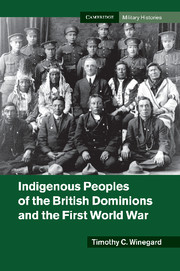Book contents
- Frontmatter
- Contents
- Figures
- Maps
- Tables
- Acknowledgements
- Note on the text
- Introduction
- 1 Colonization and the settler state
- 2 Racial constructs and martial theories
- 3 Precedents of military pragmatism
- 4 Dominion defence acts
- 5 1914: Subjugated spectators
- 6 1915–1916: King and country call
- 7 1917–1918: All the King’s men
- 8 Indigenous soldiers
- 9 The home front
- 10 Peace with prejudice
- Conclusion
- Bibliography
- Index
- References
1 - Colonization and the settler state
Published online by Cambridge University Press: 05 June 2014
- Frontmatter
- Contents
- Figures
- Maps
- Tables
- Acknowledgements
- Note on the text
- Introduction
- 1 Colonization and the settler state
- 2 Racial constructs and martial theories
- 3 Precedents of military pragmatism
- 4 Dominion defence acts
- 5 1914: Subjugated spectators
- 6 1915–1916: King and country call
- 7 1917–1918: All the King’s men
- 8 Indigenous soldiers
- 9 The home front
- 10 Peace with prejudice
- Conclusion
- Bibliography
- Index
- References
Summary
European colonization of the Dominions occurred between 1530 and 1790. The colonial experience, including frontier warfare and cultural incompatibility, influenced the perceptions and policies of Europeans and their successive governments towards indigenous peoples. In all cases, indigenes were viewed as a deterrent to European expansionism and systems were implemented to control and subjugate indigenes and to expropriate their lands. All indigenous peoples actively resisted the European threat to their cultures and populations through violence and strategies to promote self-interest. None, however, could sustain opposition in the face of European technology, increasing settler populations and the drastic reduction of their own populations through disease and war.
All Dominions generally progressed through lengthy colonial experiences under British sponsorship. The Dominions were pioneer rather than sojourner colonies and were viewed as vacant for permanent European settlement. Land soon became the common currency, rapidly bringing settlers into conflict with indigenous peoples after the inevitable shift from beachhead frontiers to pastoral expansion into the hinterlands, culminating in protracted frontier warfare. In 1516, at the onset of British imperialism, Sir Thomas More’s Utopia foreshadowed the pervasive themes of land, warfare and assimilation that dominated settler–indigenous relations in all Dominions:
If the natives wish to live with Utopians, they are taken in. Since they join the colony willingly, they quickly adopt the same institutions and customs. This is advantageous for both peoples. For by their policies and practices the Utopians make the land yield an abundance for all, which before seemed too small and barren for the natives alone. If the natives will not conform to their laws, they drive them out of the area they claim for themselves, waging war if they meet resistance. Indeed they account it a very just cause of war if a people possess land that they leave idle and uncultivated and refuse the use and occupancy of it to others who according to the law of nature ought to be supported from it.
The colonial process in all Dominions relegated indigenes to unwanted peoples – an unfortunate accessory to the ‘white man’s burden’. With the advent of Social Darwinism and racial theories in the mid-nineteenth century, Europeans created a ‘scientific’ framework to promote assimilationist and paternalistic agendas and to support the negative attributes ascribed to indigenous peoples. The exclusion of indigenes from most aspects of Dominion society, and their pragmatic use in military functions to satisfy white needs, was a reflection of their low status in the hierarchy of races and their inferior position in Dominion legal and social constructs. Colonial warfare, however, also created the contrasting but complementary concepts of martial races and of the savage, uncivilized indigene. The perceptions formed, and policies enacted, by settlers and their administrations during the settler state experience influenced most aspects of the lives of indigenous peoples, including their military value and function.
- Type
- Chapter
- Information
- Publisher: Cambridge University PressPrint publication year: 2011



